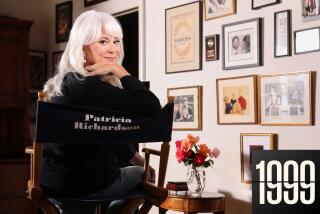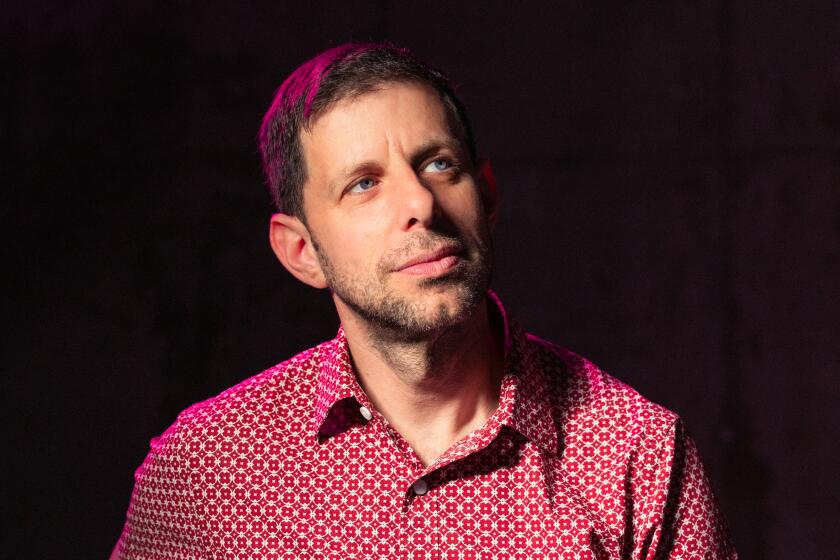Theater is in his bloodline
“If we can’t come up with stuff that’s new and fabulous and different that also sells tickets, well ... whose fault is that?”
A dashing, somewhat fidgety amalgam of George Hamilton and Anthony Perkins, 39-year-old composer-lyricist Adam Guettel is explaining to a Goodman Theatre audience why Broadway gets the musicals it deserves. The discussion is titled “Musical Theater in the 21st Century.” To many aficionados, Guettel -- grandson of Richard Rodgers, the composer who set so much of Broadway’s agenda for so much of the previous century -- represents the most accomplished exemplar of the form, even without an actual Broadway show on his resume.
The former Metropolitan Opera boy tenor is best known for his starkly beautiful collaboration with Tina Landau, “Floyd Collins.” First seen in 1994, the musical reappeared in various revised versions. The rap on “Floyd Collins” was simple: Too difficult for a mass audience. Too rarefied, perhaps. A dark and sad story, to be sure, involving a Kentucky caver who got stuck underground and never again saw the sun.
In the forthcoming book “Ever After,” about recent musical theater, Guettel says: “For years, I thought I’d be a failure if I didn’t manage to have a show on Broadway before I was 30, as my grandfather and mother both did.” Guettel’s mother, Mary Rodgers, wrote “Once Upon a Mattress.” “Now that I’m past 30 and haven’t, I can breathe again. I realize it’s OK.”
Guettel’s latest project comes from a sunnier place than “Floyd Collins.” “The Light in the Piazza,” with a libretto by Craig Lucas, opened last year in a well-regarded premiere at Seattle’s Intiman Theatre. Lucas directed that production. Since then Lucas has stepped aside as director. Intiman artistic director Bartlett Sher is restaging it, and the revised “Piazza” is at Chicago’s Goodman.
At the January Goodman discussion, someone mentions Broadway’s predominance of chortling pastiche on the order of “Thoroughly Modern Millie.” Guettel, with extreme tact, says that yes, that’s big right now. No, it’s not the sort of work he could do himself.
“Piazza,” he says, uses a musical vocabulary reliant on “a certain ruffled-shirt, wind-machine romanticism.” He illustrates the phrase by getting up from his chair, strolling away from moderator Sheldon Patinkin and over to a piano. He then plays a Lisztian theme heard in the “Piazza” overture along with variations heard elsewhere in the score.
“I promise you,” he says a little later, giving full credit to Elizabeth Spencer’s original novella and to librettist Lucas, “you will cry. No matter how healthy and happy you are.”
A blessing and burden
The next morning at a local restaurant, Guettel settles into a sun-drenched booth and orders French toast. “I’m not sure that’s butter,” he wonders. “Is that really butter? I don’t think that’s butter.”
One booth down, four of the most avid smokers in Illinois are going at it. “They really smoke here in Chicago!” Guettel remarks, adding that he likes being here, just as he liked being in Seattle last year working on “Piazza.” “In New York you don’t even think about cigarettes anymore. And I used to smoke like a ridiculous cancer-loving fool.”
He has had his battles with various drugs, as well as alcohol. Last year, after “The Light in the Piazza” opened in Seattle, a New York Times magazine profile chronicled Guettel’s chemical travails in obsessive detail.
For a while, after Yale, Guettel played in a band called Barn. It also featured David Yazbek, who later ventured into musical theater with “The Full Monty” -- a project originally offered to Guettel.
From his mother, Guettel got the suggestion to read “The Light in the Piazza.” Spencer wrote her bestselling novella in 1958. The story was published in the New Yorker and then in book form. (A film version was released in 1962.) Set in Florence and Rome, it follows the fortunes of Margaret Johnson and her grown daughter, Clara. They are women of Winston-Salem, N.C., privilege -- Margaret’s husband is a cigarette manufacturer -- on tour in Italy. Margaret appears oddly overprotective of Clara, who catches the eye of a dashing young Florentine. Love blooms, though not without its vexations and, for Margaret, a painful letting-go.
To adapt “Piazza,” Guettel first teamed up with Alfred Uhry, best known for “Driving Miss Daisy.” The collaboration, while pleasant, didn’t take. Guettel tackled it alone for a while.
“He was kind of moping around, looking really unhappy,” Lucas says. “And at some point he said: ‘I’m just going to abandon it. I can’t crack it.’ Then he played a couple of melodies for me, and I was frankly gobsmacked by them. I said, ‘Well, you can’t just throw those away.’ And I’d really loved the Spencer novella, so I told him that as a friend, uncredited, I could help him structure it.” Also, Lucas says, “I think Adam had lost sight that it was a comedy. The book is a comedy of manners, and many other things, but its essence contains comedy.”
Their arrangement solidified into a writing partnership. Workshop versions of “Piazza” popped up at the Sundance Institute Theater Lab and at Guettel’s Manhattan loft.
In Seattle, the Intiman premiere staged by librettist Lucas proved a relief. Everybody felt they were on the right track. The modest but emotionally expansive scale of the piece seemed to work. (At the Goodman, 12 performers, most from the Seattle version, are supported by a seven-piece orchestra.) The feeling, Guettel says, was that “Piazza” then needed “the added perspective and experience of another director.”
Guettel and Lucas have revised their contributions since Seattle. There’s more music to be heard in the show now. Guettel says he and Lucas are perpetually assessing the emotional tone of “Piazza.” Lucas doesn’t want to lose sight of the comedy. Guettel doesn’t want to lose sight of the yearning emotional expression.
Moving music
Friend and colleague Yazbek recalls hearing some of the “Piazza” songs at Guettel’s SoHo residence.
“The music just sticks a finger in your heart, basically,” Yazbek says. “It’s always embarrassing when someone plays you their stuff, and it’s just the two of you in a room. You don’t really want to look each other in the eye, because there’s something too personal about it. But I was completely choked up.” Maybe it’s the margarine, maybe it’s the cigarette smoke -- though eventually the smoke gets bad enough to force a move to another booth -- but Guettel seems chipper enough this morning. “Piazza” is now into its second fully produced round, and the composer-lyricist appears to be enjoying a relaxed state of readiness. New York speculation abounds, both off- and on-Broadway.
“I don’t think there’s any question we’re going,” says director Sher. “But we’ll go the way Adam wants to go.”
Breakfast is over, Guettel has been easy and stimulating company, and Richard Rodgers’ name hasn’t come up once.
But when asked if readying a musical might be easier if one were a fearsome, horrible tyrant, Guettel’s quick to answer: “Yes! It would be! It’s a very good business to be in if you’re a [tyrant]. There are a lot of examples of that -- absolute legends in our business.” A pause. “You don’t often hear of someone who’s a ‘theatrical genius -- and a super nice guy.’
“Which is not to say you have to be a jerk or anything,” he says.
With that, the charismatic man with the storied pedigree, as well as a new show to attend to, makes his way through the smoke and heads out into the cold, sunny morning.
Michael Phillips is theater critic at the Chicago Tribune, a Tribune Co. newspaper.
More to Read
The biggest entertainment stories
Get our big stories about Hollywood, film, television, music, arts, culture and more right in your inbox as soon as they publish.
You may occasionally receive promotional content from the Los Angeles Times.






